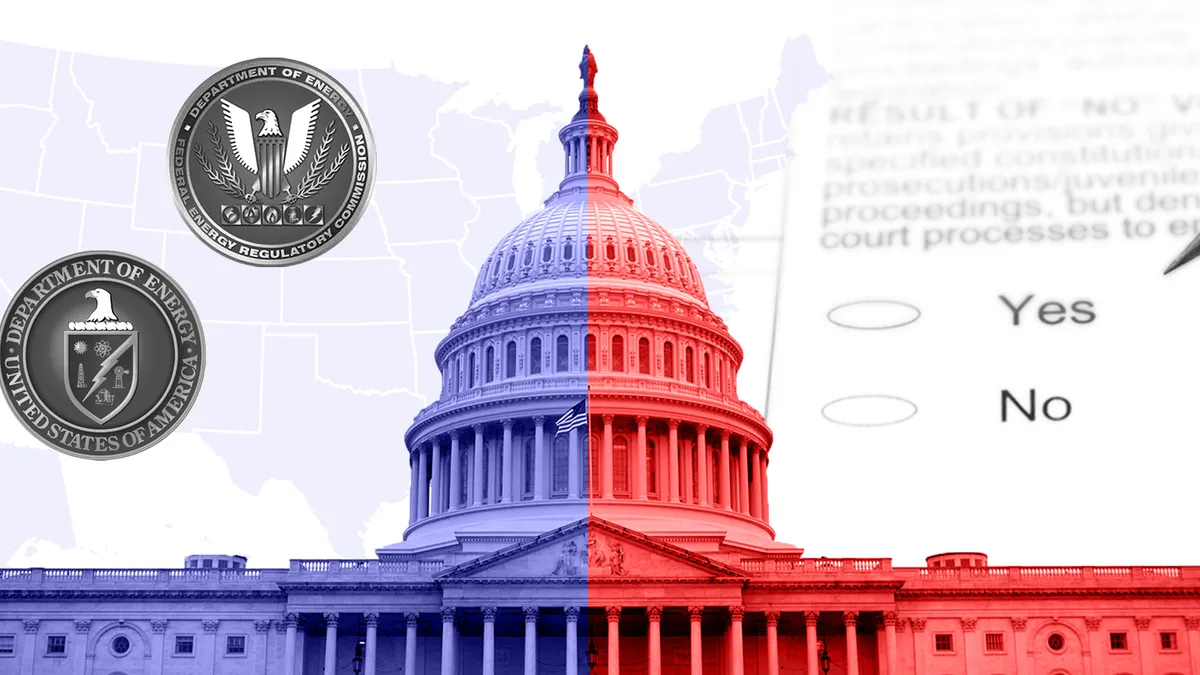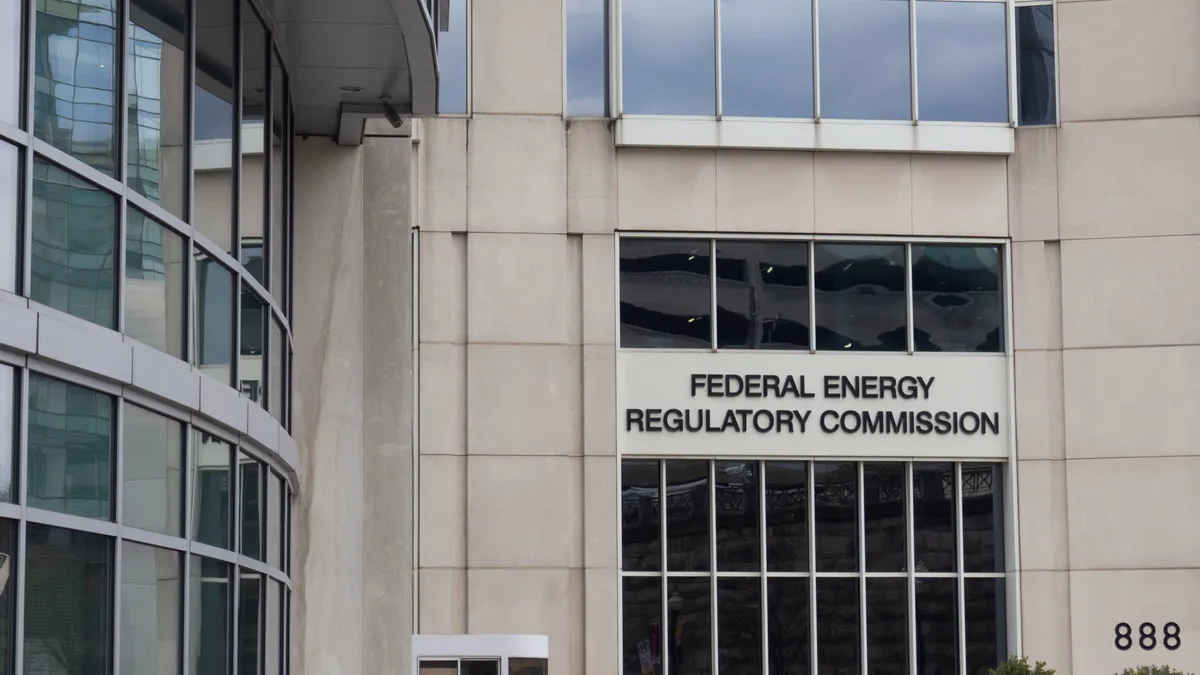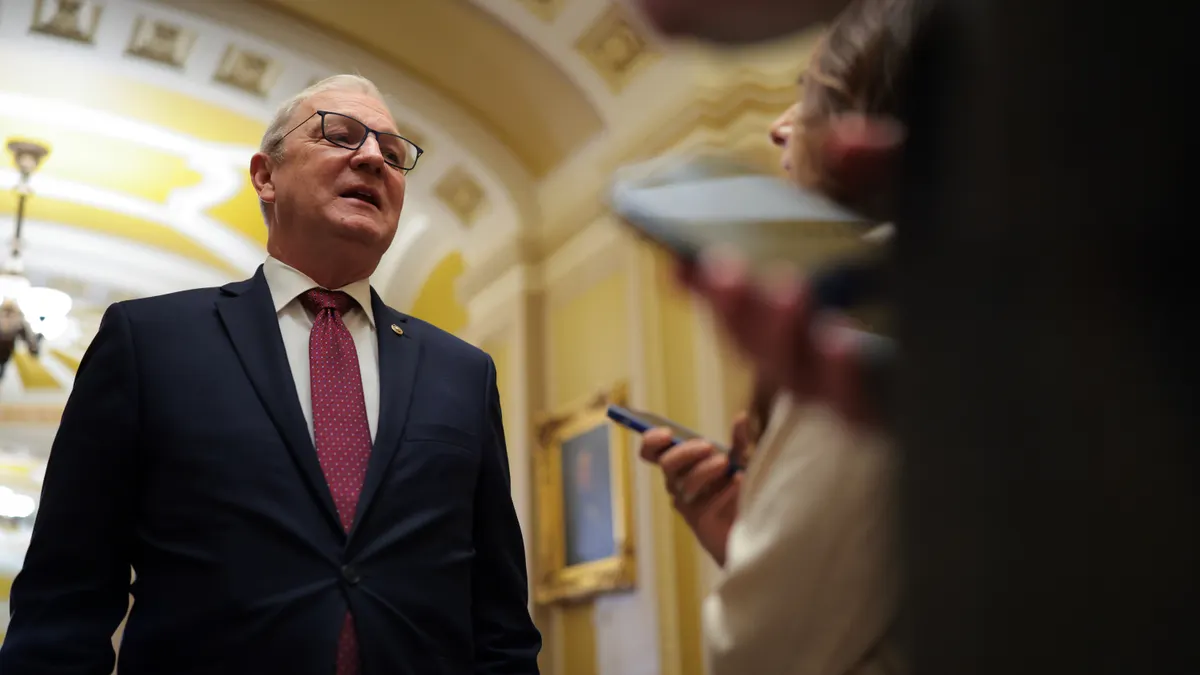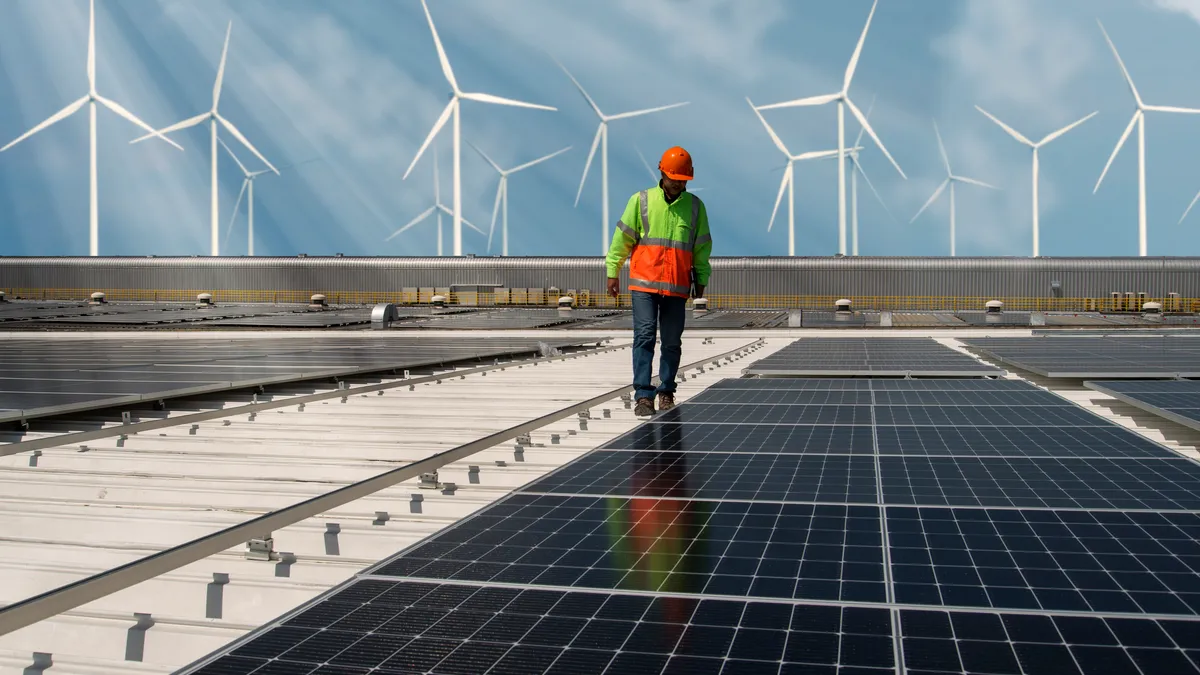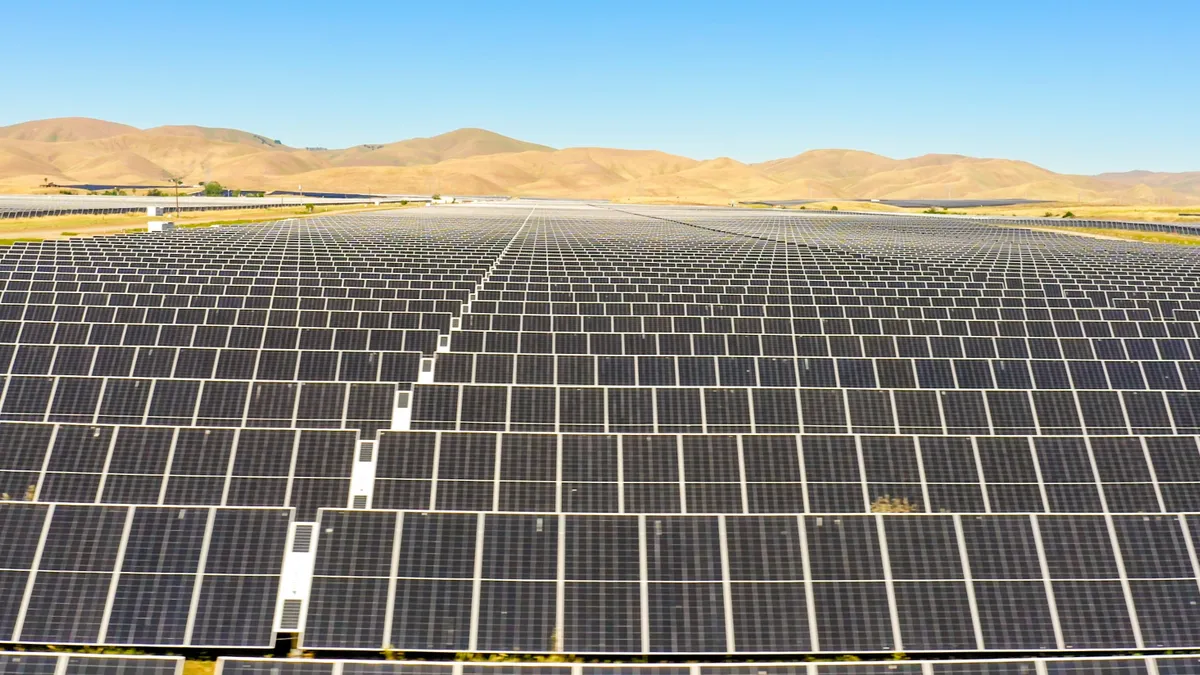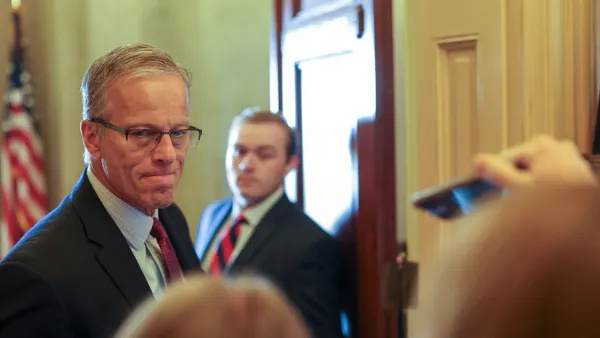A Joe Biden presidential election victory could usher in policy changes at the U.S. Department of Energy and a greater focus on renewable energy and transparency, while a second term for President Donald Trump likely means efforts to deregulate industry and support fossil fuels would continue, experts say. But just how much would change, with a Biden win, remains unclear.
The DOE "has a general mission that seems pretty consistent regardless of who takes charge," according to Frank Maisano, a senior principal at law and government relations firm Bracewell.
DOE's responsibilities include: the United States' nuclear program, including weapons and energy waste disposal, energy efficiency, research and grants. Experts say some offices, such as the Office of Energy Efficiency and Renewable Energy (EERE), will be more impacted by policy changes coming from the top.
And the extent of DOE's course shift will be closely tied to the balance of power in Congress, said Maisano.
"I think you'll see a policy agenda that changes direction if Democrats take charge of Congress," said Maisano. "The question is, how much can they get done with their own party."
"The election results will have profound implications," according to Ed Crooks, vice chair of Americas for consultancy Wood Mackenzie.
"Most of the changes will take years to work through, but over time the two candidates imply very different paths for energy in the US and around the world," Crooks wrote in an Oct. 21 blog post. Should Trump win a second term, that likely means continuity and "some further easing of regulations on the oil, gas and coal industries." he said. A Biden win would mean a "return to the Obama administration’s strategy of using regulation to cut emissions."
Staffing could be an immediate priority
While it can take years for a new administration to make rules and shift policy, some changes can come quickly. Among them: staffing.
Almost four years into his administration, President Trump "has not filled all of the key staff positions and appointments" at DOE, said Sara Baldwin, Energy Innovation electrification policy director.
"I would imagine a Biden-Harris administration would fill those positions," said Baldwin, which in turn would better enable DOE to carry out its duties and implement directives from Congress and the President. "That's a basic operational change that could make a difference.”
Those directives could include implementation of any forthcoming clean energy or climate legislative package, or a stimulus package that involves allocating resources to DOE to "dole out through grants, cooperative agreements, and/or convenings," said Baldwin. "This could also take the form of improved appliance standards or transportation-related electrification measures."
Arjun Krishnaswami, a policy analyst for the Natural Resources Defense Council (NRDC), testified before a House subcommittee in February that the EERE was understaffed, relative to historical levels.
NRDC data shows EERE staffing fell from about 700 full-time employees in Fiscal Year 2016 to 550 in 2019.
The "very first thing" a Biden-Harris administration will need to do at DOE is to staff up, said Krishnaswami, in an interview where he spoke on behalf of NRDC Action Fund. "Filling the leadership positions, as well as the technology experts within programs, is key so the agency can hopefully start to spend a lot more money and get existing money out the door."
'I would expect an increase in funding'
Staffing up DOE will be required to institute a new slate of priorities should Biden defeat Trump, said Baldwin.
It's "fairly clear that EERE has not been a priority," said Baldwin. She expects a Biden-Harris administration "would reprioritize EERE, connecting it back to and integrating it with other departments and agencies to make sure the whole of DOE has clear directives to move towards clean energy policy and viable climate solutions."
EERE will be essential to meeting new climate goals, should Biden win the election. The Biden team has come out with a goal to deliver carbon emissions-free electricity by 2035. The first step, said Baldwin, would be to increase the budget the office has to do its work, which includes funding available for grants, interagency coordination, research and programs.
"It's a very ambitious but achievable goal," said Baldwin, that will require federal departments to move towards implementation and which could mean more clean energy grants and funding for renewables research and projects.
"I would expect an increase in funding," said Baldwin. Ultimately, though, Congress will have the final say as it is lawmakers who determine how much money actually goes to departments.
Even if there is no increase in funding, Baldwin said she expects funding already allocated "would be strategically directed" to meet clean energy goals.
Current agency leadership "has taken every chance it can to hold back clean energy programs," said Krishnaswami. "We could see a re-orienting of the goals of the agency," including using the Biden carbon plan "as a roadmap for redesigning DOE programs."
Should Trump win re-election, Crooks said he expects the U.S. power sector to "continue along the path it has followed."
While Trump campaigned on revitalizing the coal industry, its output is declining as renewables and gas challenge it in the markets. "In a second term, decisions by the private sector and state governments will mean continued growth in renewables and retirements of coal-fired plants," Crooks said.
Ensuring an equitable energy transition
According to Krishnaswami, DOE is the largest public funder for clean energy innovation through research, development, demonstration projects and a small amount of project deployment.
"If we're looking at a comprehensive clean energy policy in next few years, that has to include a massive federal investment in climate solutions," said Krishnaswami.
Reprioritizing grantees to include clean energy and applicants from underrepresented groups would be "the most logical point of connection" with the agency's changed agenda under a new administration, said Baldwin. That includes "increasing the focus on ensuring diversity among grantees and serving all communities across the country."
DOE spends about $8 billion annually on research and development programs, said Krishnaswami, but it needs to be increased. If funding had been pegged to increases in inflation and economic growth then it would be closer to $30 billion, he said. "We need a plan to dramatically increase the money the agency spends on research," Krishnaswami said.
Krishnaswami said DOE needs to increase investment in demonstration and deployment of grid modernization, transmission, electric vehicles and charging infrastructure, and retrofitting building stock. He called for "at least doubling" DOE's annual R&D budget, and expanding programs to deploy clean technologies.
"We really need new funding and financing tools to enable that work," Krishnaswami said.
Baldwin said that under a Biden administration she would expect an increased focus on funding related to decarbonization, including: grants related to electrification of the transportation sector, buildings and industry; grants focused on collaboration with states, local governments and tribes that have set similar 100% renewable energy goals; grants focused on technology agnostic solutions to grid integration and optimization; and grants focused on addressing climate resilience and adaptation at the community level.
"We've seen an amplification of focus on the confluence of the energy transition and environmental justice and equity, and impacts the fossil fuel industry has had in communities across the country," including poverty, health and income levels, said Baldwin. "Given the Biden-Harris platform ... any push for a clean energy framework within DOE or other departments would also very likely ensure a focus on ensuring the transition is equitable."
Transparency around research
DOE also controls the national laboratories, and Baldwin said there have been instances of the current administration "stifling some research when it comes to market analysis and policy. ... I imagine we would see an increase in transparency" if Biden is elected.
Baldwin points to the Trump administration's decision not to publish the Interconnections Seam Study, completed by the National Renewable Energy Laboratory (NREL), in 2018. The study showed stronger transmission interconnections could boost renewables and reduce reliance on coal, but an Atlantic piece of reporting done in collaboration with InvestigateWest found the study was shelved.
The Atlantic article led to calls by lawmakers for the study to be released.
In an Oct. 5 letter to DOE's Dan Brouillette, Reps. Scott Peters, D-Calif., and Elissa Slotkin, D-Mich., raised concerns that agency research had been "altered, delayed, or indefinitely halted — based not on substantive technical or methodological concerns, but what appears to be a desire to suppress scientific results that contradict the Administration’s political priorities."
On Friday, a new draft of the report was posted by DOE.
"After conducting further analysis and model enhancements at the request of the Department of Energy, followed by a thorough review process, the results are now publicly available," NREL spokesperson David Glickson said in an email.
Glickson said the results have been submitted to a peer-reviewed journal for possible publication, and "final results will be released when the journal article is accepted for publication."
While the fundamental conclusions remain the same, experts say the findings have been diluted — and there is other research that is being held back by DOE.
"There's a slow-walking that occurs if research is not supportive of administrative goals or priorities," said Baldwin. "I anticipate a new administration would prioritize getting sound research out the door.”
Tone at the top
A change in priorities and approach at DOE will likely be tied to who is tapped to lead the agency, according to Maisano. "Policy continuation tends to happen," regardless of who is in the White House, he said.
Obama supported clean energy policies, Maisano said, but oil and gas production also grew under his administration. Likewise, the DOE under Trump may have done more with its EERE office than many give credit for, according to Maisano. "Everyone thinks the Trump administration has hated renewables," he said.
Instead, Trump put Dan Simmons in charge of EERE. "He's taken a leadership role in driving a lot of policies that are advancing renewables across the country now," said Maisano.
Should Biden win, changes at DOE will be determined by whomever is picked to lead the agency.
"Over the years DOE has been a patronage position, in some sense," said Maisano. Some people who went to DOE "didn't know much about energy systems." However, he said a new crop of DOE chiefs has been very keyed in to energy, including Obama appointees Ernest Moniz, who served from 2013 to 2017, and Stephen Chu who led the agency from 2009 to 2013.
The Trump administration's choices to lead DOE, including Rick Perry, have been knowledgeable, said Maisano. "You just can't be governor of Texas and not have a full understanding of energy issues," he said.
Brouillette has led the agency since 2019, and "rivals Moniz as one of the smartest energy secretaries we've had."
"If Trump wins, Brouillete will continue," said Maisano. "If Biden wins, I expect he will find someone with the depth of knowledge like Moniz rather than [the appointment being] a patronage spot."
"I do think it will be a person of substance," said Maisano.



